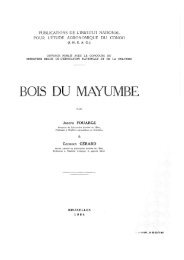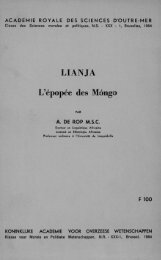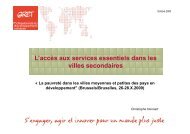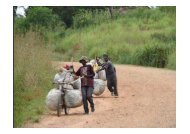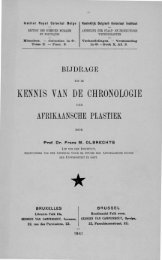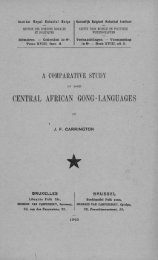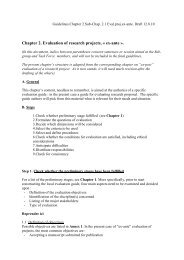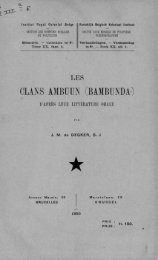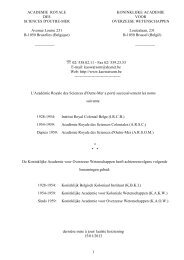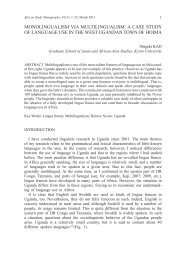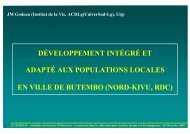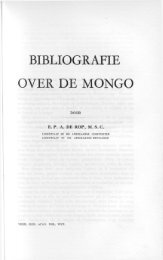(1986) n°2 - Royal Academy for Overseas Sciences
(1986) n°2 - Royal Academy for Overseas Sciences
(1986) n°2 - Royal Academy for Overseas Sciences
You also want an ePaper? Increase the reach of your titles
YUMPU automatically turns print PDFs into web optimized ePapers that Google loves.
- 194 —<br />
menten. Zij toont eveneens de nadelen van deze integratiepolitiek, ondermeer wat betreft de<br />
plaatselijke produktie en de regionale identiteit die door de sociale en economische hulp van<br />
het moederland slecht behandeld werden, en door een centraliserende assimilatiepolitiek.<br />
Vandaar de bewegingen van de autonomisten en independentisten, die periodisch de Franse<br />
Antillen in oproer brengen en die' in deze mededeling zullen besproken worden.<br />
S u m m ary . - The French <strong>Overseas</strong> Departments of the Antilles : Assimilation and regional<br />
identity. — Just after the Second World War a powerful movement of decolonisation swept the<br />
world. The elected representatives of the four “old colonies” (Guadeloupe, Martinique,<br />
Guyane and Réunion) opted <strong>for</strong> a so-called policy of assimilation. The French Parliament<br />
satisfied them with the law of departmentalization of the 19th March, 1946, which gave these<br />
four territories the status of a French <strong>Overseas</strong> Department. Since this date, assimilation has<br />
been accompanied by large works programmes, an audacious investment policy, very large<br />
annual financial transfers, accelerated social evolution, all of which have upturned the<br />
traditional aspects of these territories. This paper presents the favourable effects of the<br />
economic and social changes in the Departments of the Antilles. It also shows up the<br />
inconveniences of the integrationist policy, especially concerning local production and<br />
regional identity, maltreated by metropolitan economic and social aid and by a centralising<br />
policy of assimilation. From this stem the movements <strong>for</strong> autonomy and independence which<br />
periodically perturb the French Antilles, and which will be analysed in this paper.<br />
*<br />
* *<br />
Jusqu’au lendemain de la Seconde Guerre Mondiale, les Antilles françaises, la<br />
Guadeloupe et la Martinique, étaient restées fidèles à leur passé d’«isles à sucre».<br />
Certes, le XIXe siècle avait profondément modifié les équilibres légués par le système<br />
esclavagiste, mais tous les traits caractéristiques de l’«économie de plantation»<br />
subsistaient : concentration de la propriété terrienne, primauté des grandes cultures<br />
d’exportation (canne et banane), rôle essentiel de l’agriculture dans l'économie,<br />
politique des bas salaires, etc. Certes, l’esclavage avait été aboli en 1848, mais la<br />
stratification sociale était encore celle de la «société de plantation» un siècle plus<br />
tard : la classe dominante était <strong>for</strong>mée des propriétaires de grands domaines ou<br />
d’usines, des grands négociants contrôlant le commerce d’import-export, tandis que<br />
la masse dominée, à faible niveau de vie, était constituée des salariés agricoles, des<br />
colons partiaires, des petits propriétaires, des ouvriers et employés des villes et des<br />
bourgs. L’économie et la société des années 1945-50 restaient profondément<br />
marquées par le binôme plantation-esclavage, qui avait duré deux siècles sous sa<br />
<strong>for</strong>me première, de 1650 à 1848, et qui survivrait encore en grande partie cent ans<br />
après la mesure abolitionniste de 1848.<br />
1. La départementalisation<br />
Après la Seconde Guerre Mondiale, un puissant courant de décolonisation<br />
parcourut le monde et n’épargna pas la Caraïbe. Afin de mettre un terme à la période<br />
coloniale, la loi du 19 mars 1946 trans<strong>for</strong>ma les quatre «vieilles colonies» — la




